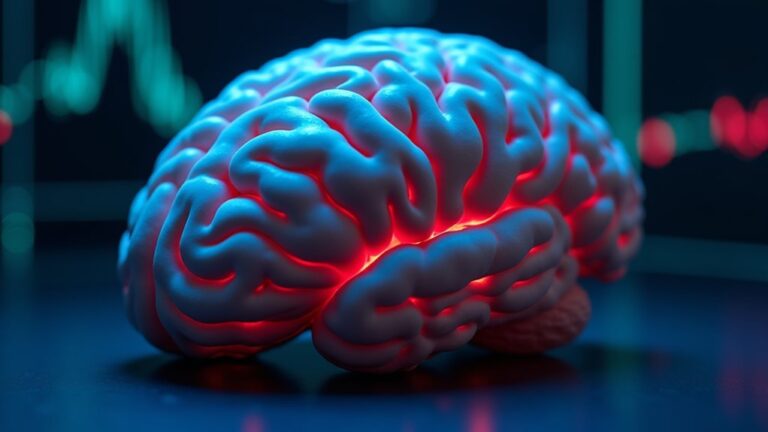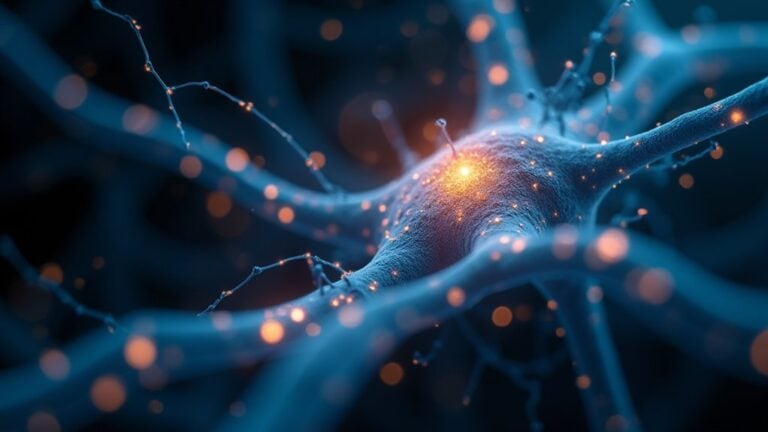Residing with PTSD often means battling relentless exhaustion that goes beyond ordinary tiredness. The mind stays on high alert, replaying traumatic memories while the body struggles to recharge, leaving people feeling drained even after rest. Sleep becomes fractured, energy crashes without warning, and daily tasks feel overwhelming.
The Connection Between PTSD and Chronic Fatigue
Because PTSD keeps the body and mind in a constant state of alert, it often leads to overwhelming exhaustion that doesn’t go away with rest. The chronic hyperarousal of PTSD means the nervous system stays on high alert, which drains energy over time.
Disrupted sleep patterns—like frequent waking or nightmares—prevent deep restorative rest, fueling chronic fatigue. Chemical imbalances in neurotransmitters, including serotonin and dopamine, contribute to both emotional exhaustion and physical weariness.
Intrusive memories and avoidance behaviors force the brain to work overtime, while hyperarousal makes relaxation nearly impossible. Without healthy coping mechanisms, this cycle persists, leaving even small tasks feeling exhausting. The body, stuck in survival mode, can’t recover, making fatigue a constant companion for those with PTSD.
How Trauma Disrupts Sleep and Energy Levels
Anytime trauma leaves its mark, the effects ripple through sleep and energy levels in ways that feel impossible to escape. A traumatic event triggers hyperarousal, keeping the brain on high alert even during rest, making deep, restorative sleep a distant dream.
Nightmares and fragmented sleep drain energy levels, fueling chronic exhaustion. As the brain struggles to regulate neurotransmitters like serotonin and dopamine, emotional fatigue takes hold. The body’s constant state of stress depletes energy reserves, creating a vicious cycle where poor sleep worsens PTSD symptoms, and those symptoms further disrupt sleep.
This loop leaves individuals feeling perpetually drained, unable to recharge, and trapped in weariness that feels endless. Over time, this imbalance can make even simple tasks feel overwhelming, reinforcing the exhaustion.
Physical and Emotional Symptoms of PTSD Fatigue
PTSD fatigue isn’t just about feeling tired—it’s a heavy mix of physical and emotional weariness that lingers no matter how much rest someone gets. People with PTSD experience deep exhaustion from the traumatic memories that hijack their mental and physical energy. The symptoms go beyond sleepiness: muscles ache, headaches strike, and even simple tasks feel overwhelming. Emotionally, they may/can/could feel numb, irritable, or detached—like their battery is constantly drained.
| Physical Symptoms | Emotional Symptoms |
|---|---|
| Muscle weakness | Numbness or detachment |
| Frequent headaches | Irritability or anger |
| Slowed reflexes | Overwhelming sadness |
| Digestive issues | Constant mental fog |
| Heart palpitations | Lack of motivation |
This dual toll on health makes daily life a struggle, compounding the impact of PTSD. Fatigue becomes more than tiredness—it’s exhaustion on every level.
The Long-Term Effects of Untreated PTSD Fatigue
Fatigue lingers like an unwelcome shadow, seeping into every part of life as PTSD goes unaddressed. Post-Traumatic Stress Disorder (PTSD), a mental health condition that affects millions, often leaves individuals with PTSD experiencing relentless exhaustion.
Without professional help, untreated PTSD symptoms—both physical and emotional—can deepen over time. Chronic fatigue disrupts daily life, making even simple tasks feel overwhelming. This condition that affects millions can lead to burnout, strained relationships, and social withdrawal.
Worse, unmanaged post traumatic stress raises the risk of depression, substance abuse, and weakened immunity. Over time, the toll on well-being grows, eroding quality of life. Acknowledging these long-term effects is vital for seeking help promptly, preventing the downward spiral untreated PTSD fatigue can create.
Effective Strategies for Managing PTSD-Related Exhaustion
Existing with perpetual fatigue does not have to be the ordinary for those grappling with PTSD. Managing the mental and physical exhaustion associated with PTSD often requires a tailored treatment plan, combining professional guidance and self-care strategies. Mental health professionals can help address the root causes of stress and fatigue, while lifestyle adjustments can substantially improve daily functioning.
Therapy and Support: Working with a professional provides tools to process trauma, reducing the emotional toll that fatigue can impact.
Mindfulness: Techniques like meditation lower stress levels and improve sleep quality.
Physical Activity: Regular exercise boosts energy and counters the sluggishness linked to PTSD.
Routine Sleep Habits: A calming bedtime ritual helps combat insomnia, a common substance of PTSD-related exhaustion.
Small, consistent steps can rebuild vigor over time.
Conclusion
PTSD fatigue doesn’t just vanish like a forgotten dial-up connection—it lingers, weaving exhaustion into daily life. Yet comprehending its roots and effects offers a path forward. By addressing sleep disruptions, stress, and emotional tolls, healing becomes possible. Small steps, from therapy to self-care, can rebuild energy over time. While the expedition isn’t quick, reclaiming essential is within reach for those who persist. The body and mind deserve that chance.





